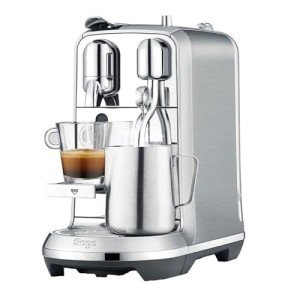This Is What Home Espresso Machines Will Look In 10 Years
The Rise of Home Espresso Machines: A Comprehensive Guide
As coffee fans continue to look for fresh and delicious brews in the house, the popularity of home espresso machines has actually risen over the last few years. No longer just the domain of cafes and cafe, these machines empower people to craft barista-quality espresso beverages from the comfort of their kitchen areas. This post will explore the numerous types of home espresso machines, their functions, and factors to consider for choosing the right one. Additionally, it will supply a selection of FAQs to assist prospective buyers make informed decisions.
Types of Home Espresso Machines
Home espresso machines can be categorized into numerous classifications based on their mechanisms and user-friendliness. Each type has its unique functions, pros, and cons.
Type
Description
Pros
Cons
Manual Espresso Machines
Requires the user to by hand manage the developing procedure, including strategies like pulling a lever to create pressure.
- Complete control over brewing process
- Compact style
- Requires ability and practice
- Time-consuming
Semi-Automatic Machines
Machine automates water circulation and pressure, but the user still controls the dosing and period of the developing procedure.
- Balance of automation and control
- Versatile
- Learning curve for improving strategies
Totally Automatic Machines
Automates the whole brewing procedure, from grinding to brewing, often with programmable settings for personalized drinks.
- Extremely easy to use
- Quick and hassle-free
- Less control over the brewing procedure
- Higher cost point
Pill or Pod Machines
Uses pre-packaged espresso capsules or pods to create coffee rapidly and easily.
- Extremely simple to use
- Minimal cleanup
- Limited flavor range
- More pricey per cup than ground coffee
Super-Automatic Machines
Integrates features of totally automatic machines with built-in grinders, allowing users to brew entire bean espresso and milk-based drinks with one touch.
- All-in-one benefit
- Ideal for milk-based beverages
- Often the most costly
- Can be bulky
Functions to Consider
When choosing a home espresso machine, possible buyers need to think about the following features to ensure they select a machine that fulfills their needs:
Grinder Type:
- Built-in grinders can offer fresher grounds however may require more upkeep.
- Separate mills permit more customization of grind size.
Pressure:
- Look for machines that produce at least 9 bars of pressure, which is ideal for developing espresso.
Water Temperature Control:
- Machines with adjustable temperature level settings permit for better extraction of flavor from beans.
Milk Frothing Options:
- Consider whether you want a manual steam wand for frothing or an automatic milk frother for convenience.
Relieve of Cleaning:
- Machines with removable parts and self-cleaning functions significantly minimize cleanup time.
Size and Design:
- Ensure the machine fits conveniently in your kitchen area and aligns with your visual preferences.
Budget:
- Set a budget before starting your search, as prices can vary considerably from affordable designs to high-end machines.
Advantages of Home Espresso Machines
Owning a home espresso machine uses numerous advantages:
- Cost-Effective: Over time, brewing espresso at home can conserve coffee lovers money compared to frequent coffee shop gos to.
- Personalization: Users can explore different beans, grind sizes, and developing strategies to find their ideal cup.
- Convenience: The ability to brew espresso any time removes the requirement to go out to a coffee shop, particularly beneficial throughout late nights or early mornings.
- Quality assurance: With a home machine, people have total control over the quality of components and developing procedures.
Disadvantages of Home Espresso Machines
Nevertheless, there are some disadvantages to consider:
- Initial Investment: High-quality espresso machines can be expensive, needing a substantial in advance investment.
- Learning Curve: Mastering the art of espresso brewing can require time and practice, which might be daunting for newbies.
- Upkeep: Like any device, espresso machines need routine cleaning and upkeep to guarantee optimal efficiency.
FAQs
1. What is Buy Coffee Maker of home espresso machine for novices?
Answer: For novices, a semi-automatic machine is frequently advised as it provides a balance in between control and automation, enabling you to find out the basics without overwhelming complexity.
2. How much should I invest on a home espresso machine?
Answer: Entry-level machines can begin around ₤ 100 to ₤ 300, while higher-end models can vary from ₤ 500 to over ₤ 2000. It's necessary to set a budget based on your expected use and wanted features.
3. Do I need a different grinder?
Answer: While some espresso machines feature built-in mills, investing in a different grinder allows for higher customization and ensures better quality premises.
4. How frequently should I clean my espresso machine?
Answer: Cleaning frequency can differ by machine type, however it's usually advised to clean up the machine after each use and perform deep cleansings weekly or monthly, depending on use.
5. Can I make milk-based beverages with any espresso machine?
Answer: Not all machines come with milk frothing capabilities. If you enjoy beverages like lattes or cappuccinos, look for a machine with a steam wand or automatic frother.
Home espresso machines are changing the method coffee aficionados enjoy their cherished brews. With different types and advanced features readily available in the market, there is something for everybody. Whether it's the pleasure of developing special dishes or merely relishing the ideal shot of espresso, purchasing a home espresso machine can boost both the coffee-drinking experience and the lifestyle for coffee enthusiasts all over. Similar to any investment, it is crucial to weigh the benefits against the potential drawbacks and select a machine that flawlessly fits both your lifestyle and choices.
